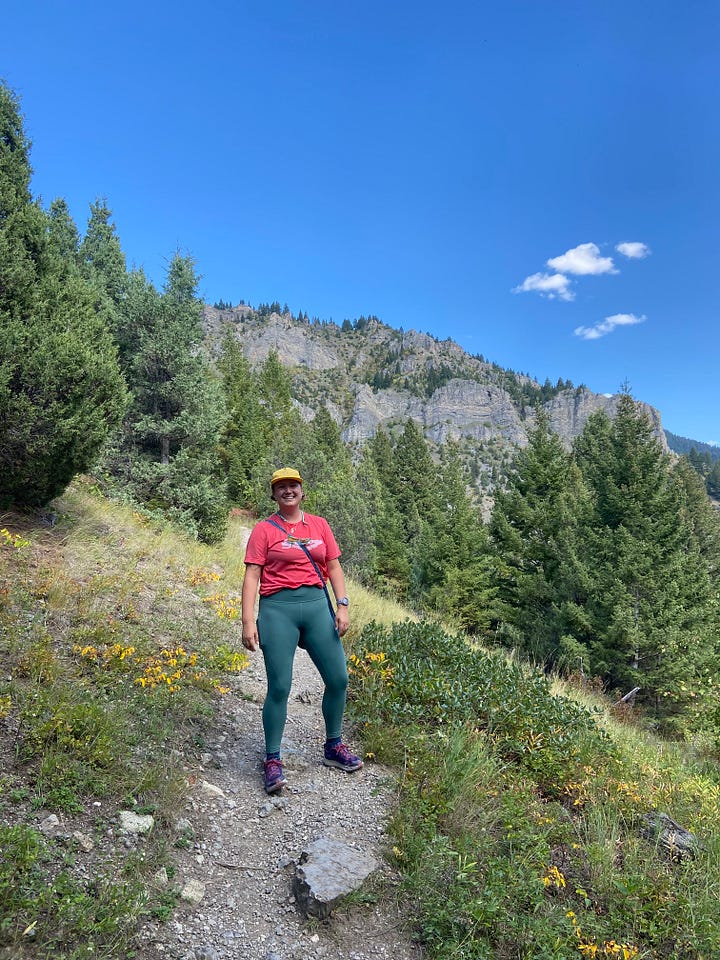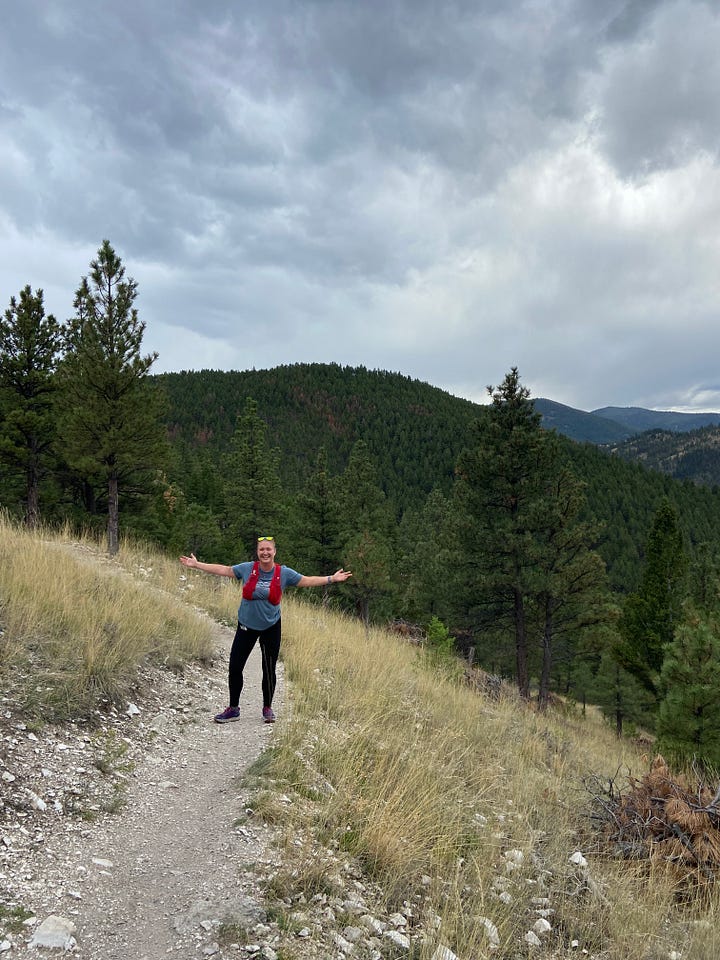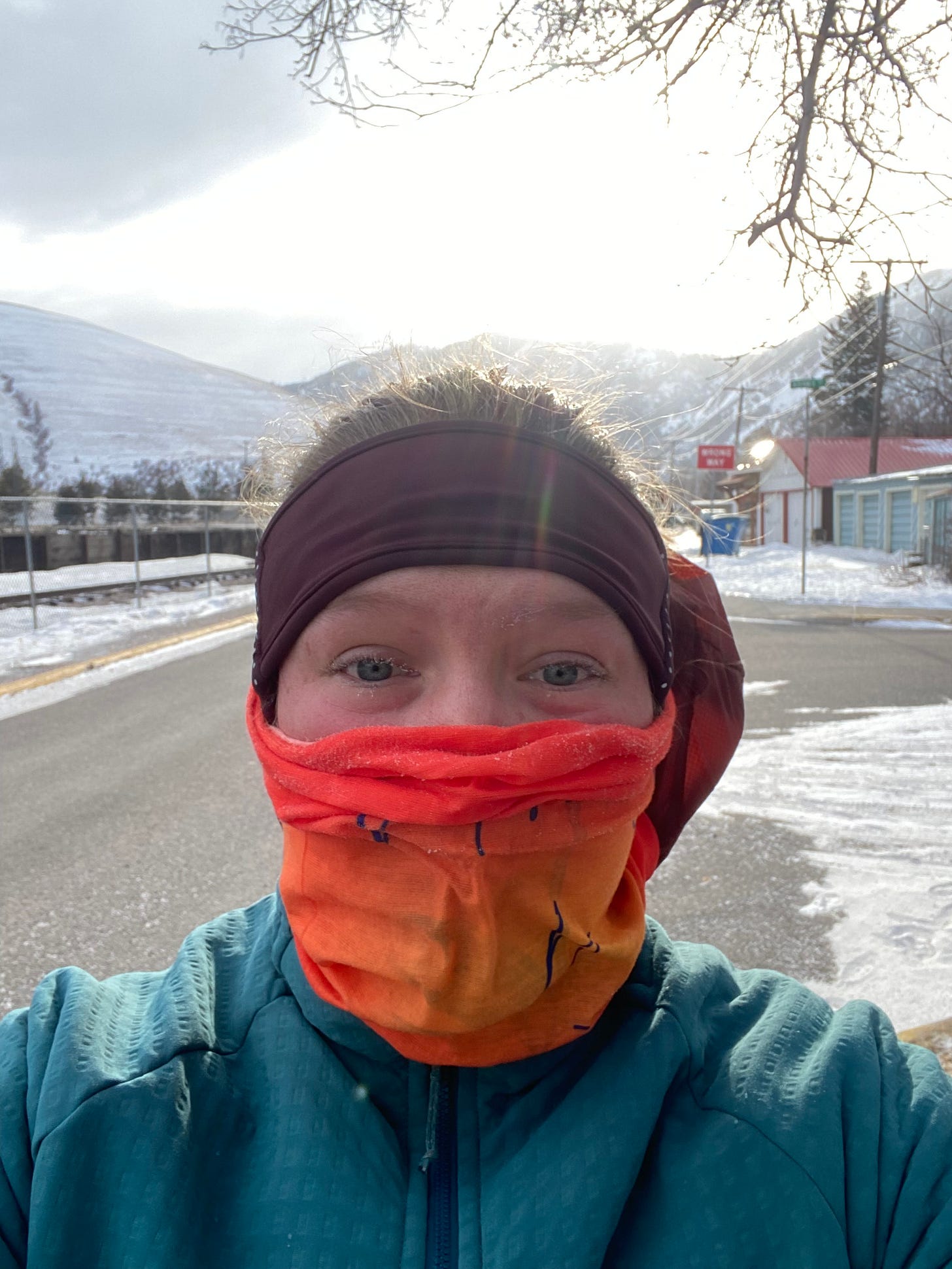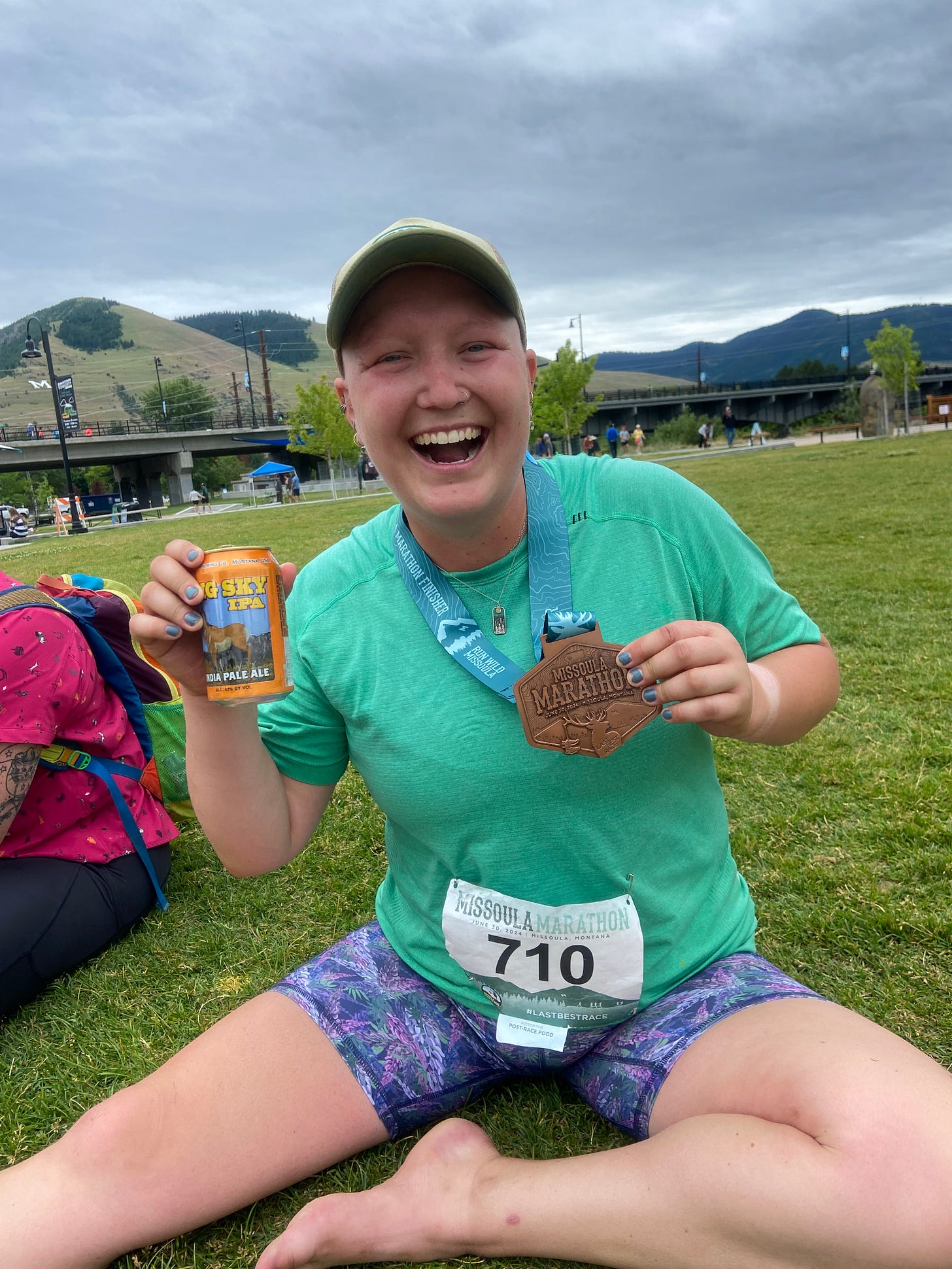Running During Cancer Treatment: A Conversation with Meg Smith
Runner Meg Smith talks about her relationship with running and how it has changed since being diagnosed with and going through treatment for cancer.
This is part of an ongoing interview series with both amateur runners and running experts. If you like this post, consider reading more of our conversations with endurance athletes.
If you know Meg Smith, you know she runs a mile every day. I love logging onto Instagram to see Meg’s latest post celebrating her one mile run, usually against the backdrop of Montana’s wild mountains. Her commitment to running inspired my own. Meg helped me see the beauty in running outside, of taking in the world around me, and appreciating that fact that we get to run.
In this interview, Meg opens up about her life as a runner. We chat about running 1 mile a day for over 1,300 days in a row, how her relationship with running changed during cancer treatment, and what she’s looking forward to accomplishing next.
Sydney Bollinger: What is your history with running?
Meg Smith: My mom got into marathon running in her mid-40s. She and a friend ran a marathon and [at that race] she Boston qualified, so then she ran the Boston Marathon. She ended up doing five marathons. [Running] became part of the culture of our household. Mom’s a runner, and then I found myself being a runner, too. I did cross country in 7th and 8th grade, and then my freshman and sophomore years of high school. I was never terribly fast.
I actually left cross country in high school because we didn’t have enough girls to fill all the varsity slots, so I had to run varsity and I came in last place in a race. It was fine, the people are lovely, but more than anything, I just knew I couldn’t compete on the level of these other girls. They’re running three miles in 16 minutes and I did it in 20. I was last by a lot… I knew I was not going to feel successful. I’ve never been one of those wiry, willowy women. I’m a stocky broad. I am built for ultra marathons, not running three miles quickly, so I stopped running cross country, but I kept running.
I’ve been a runner ever since. I’ve never not run multiple times a week. In 2021, I started doing the Plod and Pedal where you run one mile a day or bike three miles a day. I’ve done that for 4.5 years now.


SB: I remember seeing a post about your 1,000th day in a row. What was that day like?
MS: I was in Helena [MT] for work. I made my friend George come with me so we could run on the Helena trails and make a day of it. That sweet man had all of my runner friends sign a card for me, so then I was crying and running.
The first year I started doing a mile a day, I didn’t actually join the Plod and Pedal because I was convinced I wouldn’t be able to do it. I didn’t sign up for the club [and decided] I would try it for a month and see if I could do it. The first year I wasn’t officially part of the club, but I ended up running everyday anyway.
The next year I signed up for the club and kept doing it. The day of 1,000 days in a row was like trying to remember when I didn’t run everyday. It had become this daily meditation. I tell people I’m a better person after my run, and I’ve created this culture in my world where when I travel with my friends or family, they always know I have to run my mile. When I travel for work, my boss asks, “Have you gotten your mile in today?”
It was a weird day where it felt like any other day because I run everyday, but if I sit down to really think about it, it is…something that feels so much a part of who I am and what I do. I literally can’t imagine a day without it.
I actually ended up hitting 1, 352 days, and then I had my second surgery for cancer. I was in the hospital for two days and I wasn’t able to run. Now, I’ve been running every day since mid-November. I’m working my way toward that number. 1,353 is going to feel like a really big deal.
SB: Was there ever a day when you woke up and thought you couldn’t do it, but ran anyway? How did you get through that?
MS: Oh my gosh, yes. Mostly the days where I’ve had too much fun the day before. I have run very hungover. I have run in flipflops. I have run in slippers. I have run in jeans and cowboy boots. I’ve run at 11:55 PM.
I always tell people as bad as I can feel before I start my mile, I have never regretted it when I’m done.
SB: Do you always run your mile outside? Montana is so cold in the winter!
MS: It is not an official Plod and Pedal rule, but it is a Meg rule, so yes, I’ve always run my mile outside. Most notably was, I think, -25 degrees [Fahrenheit] in Missoula. I had little ice chips on my eyelashes, but it was actually one of my favorite runs. It was gorgeous and so crisp it hurt to breathe, but it was so beautiful outside.
SB: One of the things I love about running is that it’s a silly thing to do. My last interviewee, Claire Carlson, said that. Everyone’s got these little things they do and their own goals. It’s silly and fun, but that’s an important part of running.
MS: Oh, yeah. The guy that ran the first marathon literally died. This is a dumb thing that we do. There’s not a lot of outcome, and I actually love that. You and I speak the language of environmental activism and capitalism. Everything is about making a buck off of your hobbies or capitalizing on your hobbies. It’s about growth and getting better and more GDP. But there’s something about running that is like a hamster on a treadmill. It doesn’t create anything. It doesn’t have a product. It’s not marketable, really.
[Running] has this Sisyphus-rolling-the-boulder-up-the-hill-only-watch-it-come-back-down quality to it. You just keep running, and I love that. You can want to get better and you can set goals for yourself, but you can also just run and there doesn’t have to be anything more complicated to it than that.
SB: Besides the mile-a-day, what would you say is your biggest running accomplishment?
MS: This is where I get to humble brag. I ran my first marathon during chemo.
I had signed up before my cancer diagnosis. During chemo, I had felt fine-adjacent. I kept doing my mile and I was on a two-week transfusion rotation. Right after it, for the first week, I wouldn’t feel great, but then there’d be a week where I could run a little more, like up to six miles. I was really only running up to about six miles at a time during the two months before the marathon. Then I switched chemo drugs and felt a lot better, so I thought I could do [the Missoula Marathon]. I hadn’t deferred my registration, so one day I just ran fifteen miles.
It was slower than shit and a lot of walking. They were 14-minute miles, but to do the Missoula Marathon, you have to run a 15-minute mile.
I trained for five weeks. I would not recommend that. It was so dumb, but it’s funny looking back. I was also on a lot of steroids from the chemo, so I was Lance Armstrong-ing it.
My first marathon was just a huge accomplishment anyway, but there was this added layer that felt like a reclaiming. I really felt like I lost a lot of autonomy over my body [during treatment], so being able to do that was pretty cool.
SB: How has your relationship to running changed since being diagnosed with cancer?
MS: Being on the other side of a lot of my treatment now, my relationship with running is really just gratitude that I get to still do this. Anytime I used to think it, “Oh, the drudgery,” or “God, I have to do this,” now I get to do this. Being in treatment I met a lot of people and saw a lot of people who were so much sicker than I was and running was not going to be part of their life, maybe ever again. It’s really just gratitude. It can’t even feel like drudgery anymore. I feel so lucky to be able to run.
SB: You said when you were training for the marathon, you realized as long as you ran a 15-minute mile, you could finish. Did going through that experience change or redefine what it means to find success in running?
MS: When I realized I was going to be slower than I wanted, I got to settle into how the journey of the run is about how you feel, not about how fast you do it. I had already decided I don’t really care how long it takes me to do things. I want to feel good when I do them.
The thing is, when you run a marathon, nobody asks you how fast you ran it. They just say, “It’s so cool you ran a marathon.” That was eye opening, People don’t care and I realized that I don’t care. I’ve never wondered how long it took somebody to run. I don’t care how long it took them to run a marathon. They ran a fucking marathon!
We all have goals for ourselves and race day can shatter all of those goals depending on how you feel when you wake up. To release that is a big deal. Being a slow runner in the running community can be hard because people are fucking fast and really in shape and very strong runners. It can feel like you’re constantly left behind or slower than the rest.
The Missoula running community is insane. Everybody here is very fast. [I] finish last all the time for trail races and half marathons in Missoula. People here are so fast it can make you feel like you’re not a real runner or you’re not doing it right. But even the fast people don’t care. They’re just like, “You are out here, too.”
SB: What’s next for you and running? Do you have any races you’re planning on doing?
MS: I have a bunch of friends doing the Missoula Half Marathon, so I’ll do that with them, which should be really fun.
And then, I would love to train for a 50k. I would love to do an ultramarathon at some point and I think it will be next year. I want to give my body some time to recoup. I was just talking to one of my friends and it’s been five months since the end of the bulk of my treatment. I wrapped up radiation at the end of January and I finally feel like I have my feet under me again. I hadn’t realized how much I didn’t feel 100% when I was running until I felt it come back.
The thing about chemo is that it builds. When I started chemo last March, it was a slow decline. I didn’t quite notice how bad I was feeling. In the last three weeks, I can casually run a 10- or 11-minute mile again. During cancer treatment and immediately afterward, I was slogging to get 12-13 minute miles.
My body has been through a lot, so it makes total sense. But now, I can feel my pace differently. I feel that my muscles are more in sync and my lungs are more open. It just feels easier. There’s a physical loosening that has changed the game for me and makes me excited about running again.






Oh Sydney, honored to be included in this interview series! What a fabulous reminder that if you run, at all, you are a “real” runner 💚
It doesn't matter how fast you go, it matters how you feel doing it... I'm going to remember that.